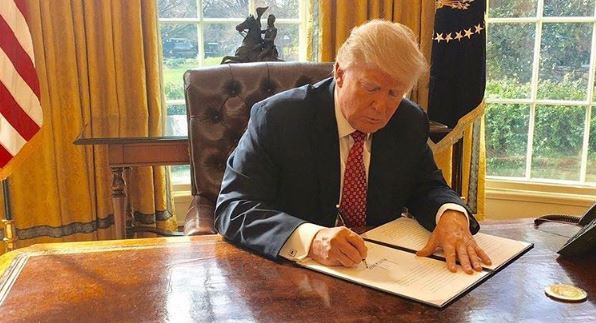Implementing the Refugee EO: The State Department Should Consider Refugee Agency Assurances as Bona Fide Relationships
While progress has been made in implementing the Supreme Court’s stay of lower court injunctions of President Trump’s revised refugee executive order (EO), the State Department’s current stance on refugee admissions requires further review. According to the State Department’s most recent guidance, an experienced refugee agency’s “formal assurance” that it will provide all requisite assistance in a refugee’s resettlement in the U.S.

Published by The Lawfare Institute
in Cooperation With

While progress has been made in implementing the Supreme Court’s stay of lower court injunctions of President Trump’s revised refugee executive order (EO), the State Department’s current stance on refugee admissions requires further review. According to the State Department’s most recent guidance, an experienced refugee agency’s “formal assurance” that it will provide all requisite assistance in a refugee’s resettlement in the U.S. is “not sufficient in and of itself” to establish the “bona fide relationship” with a U.S. entity that the Supreme Court set as the gold standard. The Department should revisit this view, which introduces needless uncertainty and does not reflect the context and consequences of the assurances that experienced refugee agencies provide.
As a longtime immigration lawyer, I can testify that over the years, the State Department has worked painstakingly with international organizations and other states to establish a robust process for the resettlement of refugees in the United States. Respected interfaith agencies such as the U.S. Conference of Catholic Bishops (USCCB), HIAS, and the Lutheran Immigration and Refugee Service are an integral part of the process. The long course of dealing between the State Department and these agencies is so well-developed that the agencies have a nickname in the trade: “volags” (volunteer agencies). Every week or so, the volags conduct a teleconference with State Department officials in order to match those already granted refugee status by the U.S. both with a specific U.S. destination and with a local volag branch or affiliate that will meet the refugee upon his or her arrival and coordinate assistance in housing, education, employment, and other needed services. The regular State-volag meetings only consider individuals who have passed a security check by the U.S. Department of Homeland Security (DHS) and have been fully approved for resettlement in the United States.
These are not fly-by-night organizations dabbling in refugee assistance: a venerable interfaith volag like USCCB puts its reputation on the line with each and every assurance made at the coordination meeting with State Department officials. The State Department and DHS have worked with USCCB, HIAS, and a small number of other established groups for years, shoring up the United States’ commitment to refugees. Regular coordination meetings in which the USCCB and other groups render their formal assurances are not “idle ceremon[ies],” to cite language by Justice Frankfurter quoted by Chief Justice Roberts in Nken v. Holder. In these State-volag coordination meetings, the participants mean business. The volags all have a demonstrable, longstanding track record of following through on their promises. Otherwise they wouldn’t be “in the room.”
A formal assurance by the USCCB or another volag therefore encompasses much more than the verbal promise made at the coordination meeting with the State Department. That assurance embodies a commitment to caring and effective assistance that the volag has demonstrated over time.
Moreover, any other information that State Department officials might wish to review regarding the refugees to be resettled, including the results of DHS security checks, is already in the government’s possession when the volags enter the conversation. Proceedings at the regular coordination meetings proceed with that information already “baked in.”
Under the circumstances, a volag’s assurance clearly meets the Supreme Court’s standard of a bona fide relationship that is “formal, documented, and formed in the ordinary course.” While the Supreme Court cautioned that relationships formed “for the purpose of evading” the revised EO were not protected by the stay, volag assurances are the antithesis of an evasion. Similarly, the earnest undertakings made by volags don’t fit the Court’s cautionary reference to a hypothetical nonprofit group that would “contact foreign nationals from the designated countries [identified in the EO], add them to client lists, and then secure their entry by claiming injury from their exclusion.”
This reference to gaming the system occurs in part B of the Court’s order dealing with the country restrictions in the EO, and so may not apply to refugees at all, whom the Court addresses in Part C. In any case, the volags that provide assurances in refugee resettlement bear no resemblance to the unscrupulous entities that elicited the Court’s concern. The State Department has long recognized this by the course of its own dealings with the major refugee agencies. Requiring further information from these established groups is likely to be duplicative, redundant, or downright harmful to refugee processing, in which the U.S. has long played a formative role.
In sum, the State Department’s acknowledgment that a volag’s formal assurance is “sufficient in and of itself” to establish a “bona fide relationship” with the United States would merely continue the longtime course of dealing of the U.S. government. That assurance already embodies the Supreme Court per curiam stay order’s focus on relationships “formed in the ordinary course.” The government has shown welcome flexibility by including fiancés and fiancées in its guidance (although it also should include grandparents and grandchildren, as I explain here). One hopes that the government’s ongoing efforts to comply with the Court’s order will soon reflect a similar common-sense understanding of refugee agency assurances.



.png?sfvrsn=48e6afb0_5)

